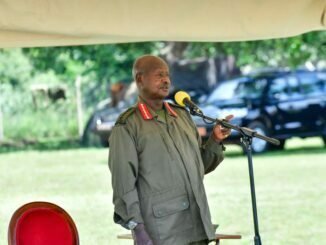
Kampala, Uganda | URN | Political players and commentators have described as impractical, illegal, biased and in bad faith, the pronouncement by the Electoral Commission (EC) to ban open-air campaigns in the run-up to the 2021 General Elections.
Electoral Commission (EC) chairman Justice Simon Mugenyi Byabakama announced on Tuesday 16th that in order to comply with the guidelines issued by the Ministry of Health to limit the spread of coronavirus disease COVID-19, the only campaign mode that will be allowed is using the media for all the candidates seeking elective positions.
This, the political players say can only benefit the incumbent party; the National Resistance Movement (NRM) whose members or those affiliated to them own the majority media outlets in Uganda especially radio.
They argue that the law obliges the Electoral Commission (EC) to organize a normal election and if it can’t, like in the present circumstance, it should throw back the matter to parliament to amend the existing laws to either provide for an election in such circumstances or postpone it to such a date that it is possible to hold it normally.
Asuman Basalirwa, the President of Justice Forum and the chairman of the Interparty Organization for Dialogue (IPOD), an entity that brings together all parties with a representative in parliament said the constitution under article 103 allows for a postponement of an election.
This thinking is shared by Yusuf Serunkuma, a political pundit and a PhD candidate at Makerere University Institute of Social Research. Serunkuma says if the government could afford to lockdown the entire country; a thing that has devastated livelihoods and the economy, why couldn’t they lockdown an election.
Serunkuuma implores the opposition to boycott this election because according to him, if they have been struggling to challenge the President Museveni when the situation was quite normal, how do they expect to win now when everything seems to be against them.
“Before we even start having a conversation about whether parties can have scientific campaigns first look at the legal and material challenges that they face. I think we need to first discuss those challenges before discussing whether the roadmap even makes sense for political parties,” Serunkuma said.
“There is a bit of sycophancy among political parties but I’m imploring the cardinal parties to boycott this election. It will reflect so bad on them because the incumbent will come up with parties that stand against them, but you either have a normal election or no election at all because it’s a waste of time.”
Sulaiman Kakaire, the deputy spokesperson of the Alliance for National Transformation observes that this position has never resulted in anything anywhere in Africa. He says that although boycotting an election would be the most ideal in the circumstances, it’s a hard sell to opposition political parties. In the past, some political parties have boycotted elections in Uganda.
In 1996, Milton Obote, the then leader of Uganda People’s Congress directed his party not to participate in the election citing the illegality of the 1995 constitution that had put parties in abeyance. Since then, the UPC has never been the same as space it occupied before 1996 as the main opposition party was ceded to the Democratic Party and later Forum for Democratic Change.
Read Also: Uganda’s opposition groups challenge new 2020/2021 general election roadmap
Politicians who defied the party president and went ahead and contested, some of them up to this day like Cecilia Ogwal are still active while others who towed the party line were erased politically.
But the NRM says that nothing that the government does can please the opposition. Rogers Mulindwa, the spokesperson of the NRM secretariat says that as a party, they welcome the Electoral Commission (EC) roadmap and unlike the opposition, they will not whine about it but try to work within it.
Mulindwa also denies that as a party, they were consulted before the Electoral Commission a released a revised roadmap.
“If it’s true that President Museveni was consulted, he wasn’t consulted as the chairman of NRM but as the CEO of the country because elections or no elections, he remains the president who should know about something so pertinent like that, before it happens,” Mulindwa said.



